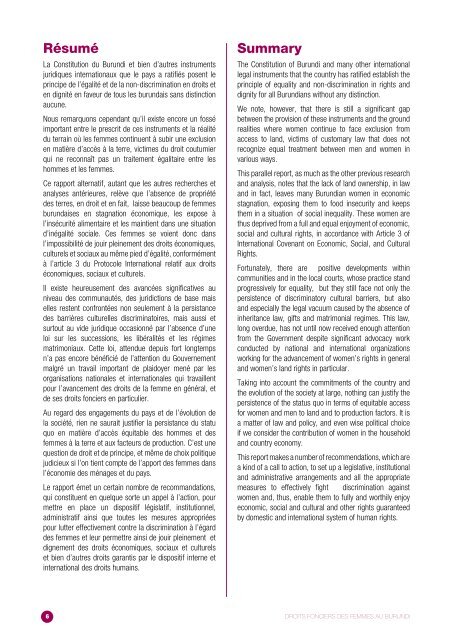You also want an ePaper? Increase the reach of your titles
YUMPU automatically turns print PDFs into web optimized ePapers that Google loves.
Résumé<br />
La Constitution du Burundi et bien d’autres instruments<br />
juridiques internationaux que le pays a ratifiés posent le<br />
principe de l’égalité et de la non-discrimination en droits et<br />
en dignité en faveur de tous les burundais sans distinction<br />
aucune.<br />
Nous remarquons cependant qu’il existe encore un fossé<br />
important entre le prescrit de ces instruments et la réalité<br />
du terrain où les femmes continuent à subir une exclusion<br />
en matière d’accès à la terre, victimes du droit coutumier<br />
qui ne reconnaît pas un traitement égalitaire entre les<br />
hommes et les femmes.<br />
Ce rapport alternatif, autant que les autres recherches et<br />
analyses antérieures, relève que l’absence de propriété<br />
des terres, en droit et en fait, laisse beaucoup de femmes<br />
burundaises en stagnation économique, les expose à<br />
l’insécurité alimentaire et les maintient dans une situation<br />
d’inégalité sociale. Ces femmes se voient donc dans<br />
l’impossibilité de jouir pleinement des droits économiques,<br />
culturels et sociaux au même pied d’égalité, conformément<br />
à l’article 3 du Protocole International relatif aux droits<br />
économiques, sociaux et culturels.<br />
Il existe heureusement des avancées significatives au<br />
niveau des communautés, des juridictions de base mais<br />
elles restent confrontées non seulement à la persistance<br />
des barrières culturelles discriminatoires, mais aussi et<br />
surtout au vide juridique occasionné par l’absence d’une<br />
loi sur les successions, les libéralités et les régimes<br />
matrimoniaux. Cette loi, attendue depuis fort longtemps<br />
n’a pas encore bénéficié de l’attention du Gouvernement<br />
malgré un travail important de plaidoyer mené par les<br />
organisations nationales et internationales qui travaillent<br />
pour l’avancement des droits de la femme en général, et<br />
de ses droits fonciers en particulier.<br />
Au regard des engagements du pays et de l’évolution de<br />
la société, rien ne saurait justifier la persistance du statu<br />
quo en matière d’accès équitable des hommes et des<br />
femmes à la terre et aux facteurs de production. C’est une<br />
question de droit et de principe, et même de choix politique<br />
judicieux si l’on tient compte de l’apport des femmes dans<br />
l’économie des ménages et du pays.<br />
Le rapport émet un certain nombre de recommandations,<br />
qui constituent en quelque sorte un appel à l’action, pour<br />
mettre en place un dispositif législatif, institutionnel,<br />
administratif ainsi que toutes les mesures appropriées<br />
pour lutter effectivement contre la discrimination à l’égard<br />
des femmes et leur permettre ainsi de jouir pleinement et<br />
dignement des droits économiques, sociaux et culturels<br />
et bien d’autres droits garantis par le dispositif interne et<br />
international des droits humains.<br />
Summary<br />
The Constitution of Burundi and many other international<br />
legal instruments that the country has ratified establish the<br />
principle of equality and non-discrimination in rights and<br />
dignity for all Burundians without any distinction.<br />
We note, however, that there is still a significant gap<br />
between the provision of these instruments and the ground<br />
realities where women continue to face exclusion from<br />
access to land, victims of customary law that does not<br />
recognize equal treatment between men and women in<br />
various ways.<br />
This parallel report, as much as the other previous research<br />
and analysis, notes that the lack of land ownership, in law<br />
and in fact, leaves many Burundian women in economic<br />
stagnation, exposing them to food insecurity and keeps<br />
them in a situation of social inequality. These women are<br />
thus deprived from a full and equal enjoyment of economic,<br />
social and cultural rights, in accordance with Article 3 of<br />
International Covenant on Economic, Social, and Cultural<br />
Rights.<br />
Fortunately, there are positive developments within<br />
communities and in the local courts, whose practice stand<br />
progressively for equality, but they still face not only the<br />
persistence of discriminatory cultural barriers, but also<br />
and especially the legal vacuum caused by the absence of<br />
inheritance law, gifts and matrimonial regimes. This law,<br />
long overdue, has not until now received enough attention<br />
from the Government despite significant advocacy work<br />
conducted by national and international organizations<br />
working for the advancement of women’s rights in general<br />
and women’s land rights in particular.<br />
Taking into account the commitments of the country and<br />
the evolution of the society at large, nothing can justify the<br />
persistence of the status quo in terms of equitable access<br />
for women and men to land and to production factors. It is<br />
a matter of law and policy, and even wise political choice<br />
if we consider the contribution of women in the household<br />
and country economy.<br />
This report makes a number of recommendations, which are<br />
a kind of a call to action, to set up a legislative, institutional<br />
and administrative arrangements and all the appropriate<br />
measures to effectively fight discrimination against<br />
women and, thus, enable them to fully and worthily enjoy<br />
economic, social and cultural and other rights guaranteed<br />
by domestic and international system of human rights.<br />
6<br />
<strong>DROITS</strong> <strong>FONCIERS</strong> <strong><strong>DE</strong>S</strong> <strong>FEMMES</strong> <strong>AU</strong> <strong>BURUNDI</strong>


